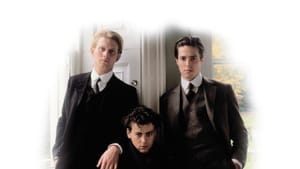Stay in the Loop
BSR publishes on a weekly schedule, with an email newsletter every Wednesday and Thursday morning. There’s no paywall, and subscribing is always free.
Love that dare not speak its name
Re-release of Merchant Ivory's 'Maurice'

It’s amazing to realize, with the benefit of hindsight, that the 1980s can be considered something of a golden age of gay cinema. While the decade didn’t produce many gay films, what was produced was often choice: Torch Song Trilogy, Another Country, Parting Glances, and, of course, Maurice.
Maurice was produced by Merchant Ivory Productions, directed by James Ivory, and released to critical praise in 1987. It starred James Wilby, Hugh Grant, Rupert Graves, and Ben Kingsley. This year marks the 30th anniversary of the film’s original release; its current owner, Cohen Media Group, has produced a spiffy new 4K restoration that will see theatrical release this summer.
Just friends
The film is set in pre-World War I England and follows a group of upper-class friends, first at Cambridge University and then as they begin their adult lives and careers. The story focuses on Maurice and Clive, who form a particularly tight bond that evolves into a love affair. However, Clive, given his upbringing, insists that the relationship remain platonic; Maurice, despite the deep passion he feels for his friend and his own frustration, acquiesces. As Clive enters into upper-class society and politics, he sees constant evidence of how his life would be ruined if his relationship with Maurice, though platonic, should become public knowledge. Clive becomes physically ill, while Maurice seeks medical help to be cured of this “disease of the Oscar Wilde variety.”
Director James Ivory pulls out many telling moments, such as Clive nearly collapsing with fear and panic when an acquaintance is sentenced to six months' hard labor, and the ruin of his place in society for flirting with a working-class man. Another particularly moving scene occurs when Maurice sobs uncontrollably in his sleep while dreaming of spending his life with a woman.
Merchant Ivory Productions had an unequaled reputation for making absolutely gorgeous films on relatively modest budgets, particularly with their series of adaptations of E.M. Forster novels, of which Maurice is one. It’s easy to see that Maurice is the cinematic precursor to Downton Abbey and other modern-day historical set pieces. Because of its lush production values and historical setting, Maurice does not in any way feel 30 years out of date. It could show up on PBS as a chapter of Downton Abbey and not look at all out of place.
But what keeps Maurice as au courant as any contemporary gay-themed film is a deep understanding of how psychologically and emotionally damaging life in the closet is and was—particularly among the upper class of Edwardian England, still in the throes of Victorian oppression.
What, When, Where
Maurice. Based on the novel by E.M. Forster, screenplay by Kit Hesketh-Harvey and James Ivory, James Ivory directed. Opens July 14, 2017, at the Landmark Theatres Ritz at the Bourse, 400 Ranstead Street, Philadelphia. Philadelphia area showtimes.
Sign up for our newsletter
All of the week's new articles, all in one place. Sign up for the free weekly BSR newsletters, and don't miss a conversation.

 Gary L. Day
Gary L. Day